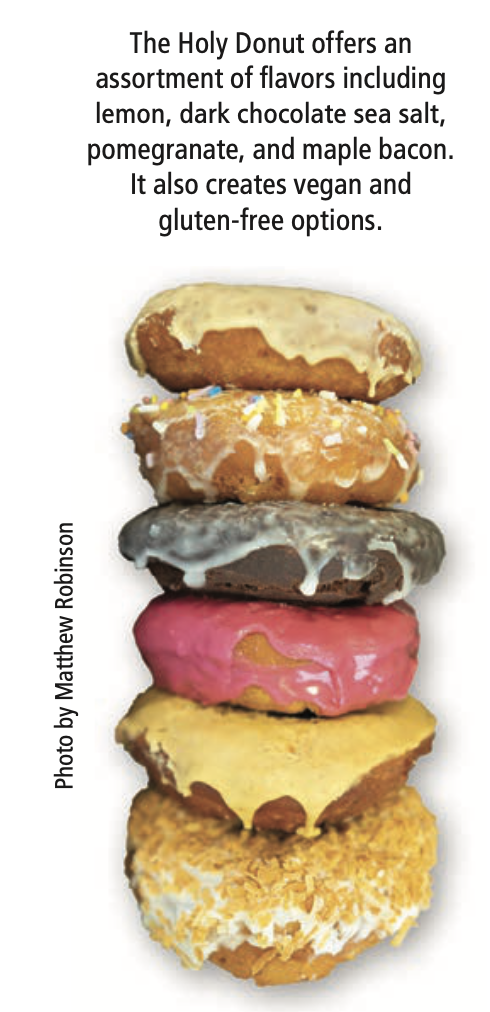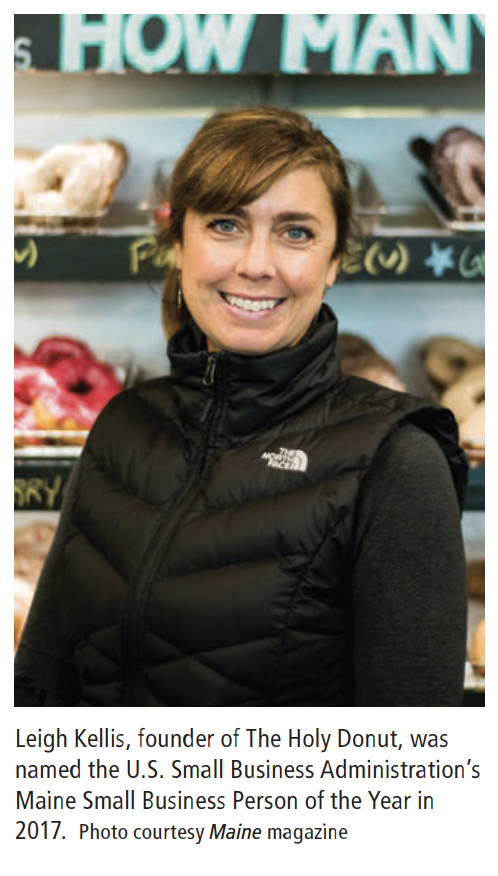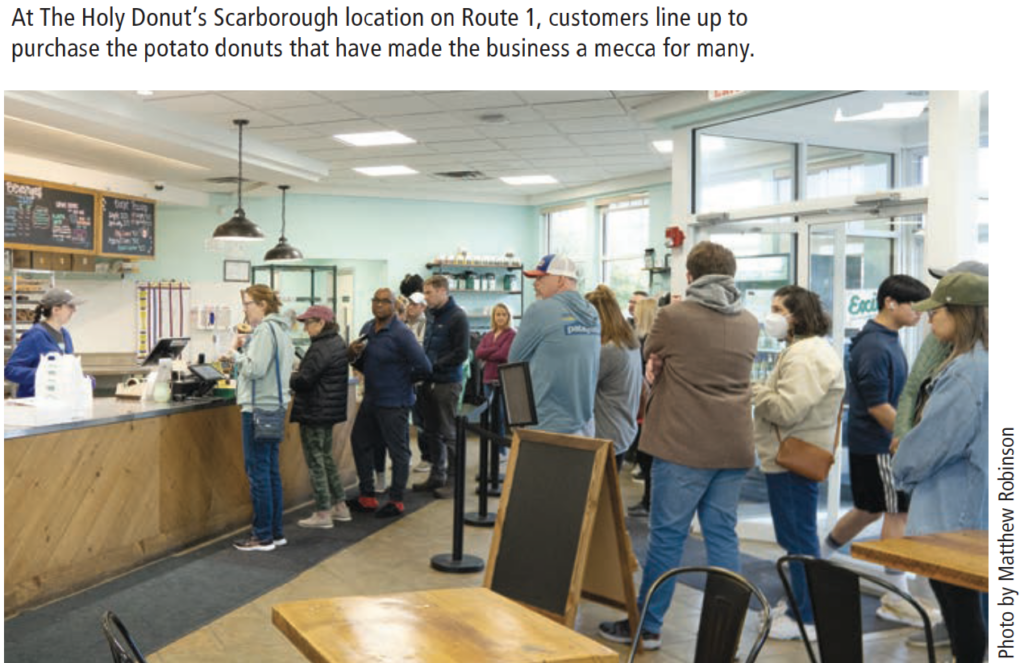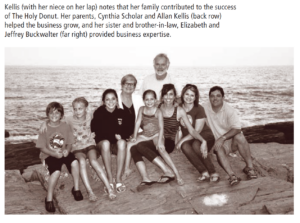A LINE OF CARS wraps around the outside of the building and inside customers curve around the contours of the shop — a renovated space that once housed a Tim Horton’s. Filled with bright teal and gray accents and tantalizing photographs of donuts around the room, the space is no longer the Canadian eatery, but the baker’s rack behind the counter is still filled with warm, steaming treats. From chocolate sea salt, to pomegranate, to pumpkin, there is a flavor for both the creature of comfort and the adventurous diner.
 Smiling and greeting customers, owner Leigh Kellis ’97 moves around The Holy Donut’s Scarborough location dining area with ease. Though she is no longer heavily involved in the day-to-day activities and the business has grown to four locations and a creative studio, she has a quiet comfort in the shop fielding questions and chatting with patrons.
Smiling and greeting customers, owner Leigh Kellis ’97 moves around The Holy Donut’s Scarborough location dining area with ease. Though she is no longer heavily involved in the day-to-day activities and the business has grown to four locations and a creative studio, she has a quiet comfort in the shop fielding questions and chatting with patrons.
A visiting couple asks about which donuts to select, staring intently at the donuts on display. “We had [the donuts] years ago on a trip and haven’t stopped thinking about them. We had the day free today and wanted to peep some leaves, so we used it as an excuse for the road trip and to come here.” They had driven from Connecticut that morning just to drive back home, a nearly eight-hour round trip seeking fall foliage and the undeniably unique Holy Donut.
Watching Kellis, you would never know that she found her passion during a time of deep despair. A divorce had led her to crave intense, indulgent comfort food. Honing in on the bullseye of such food with deep-fried, fatty, sugary, and carb-heavy donuts was a comfort and relief for her during a very difficult time.
“I wanted and needed old-school, child-like, nostalgic, comfort food. And I just — all I could think about was donuts. I was eating them, and I was literally traveling for donuts, looking in California, Boston, places like that, and 12 years ago there were very few artisan donut shops. It was mostly Dunkin’ Donuts, which was not an option for me, so I would go seeking out places that were doing cool donuts and I didn’t find many.
“So, I decided to start my own.”
A Pivotal Time
Although Kellis had found her passion, she needed to perfect her specialty donuts and create a sustainable business, and the donut business initially put her at a bit of a crossroad. Just as The Holy Donut got its start, she was ready to begin a career teaching middle school Spanish, and she wrestled with the option of diving headfirst into her business.
As an undergraduate at the University of Maine, Kellis studied Spanish — an interest which led her to study abroad in Cuernavaca, Mexico. The immersion program placed Kellis with a host family for two weeks who helped improve her Spanish. The experience had a lasting impact on the way she came to view the world, sparking her passion for travel and curiosity for new cultures and cuisine.
“My parents actually forced me to go [to UMaine],” she reflects. “I had wanderlust and a massive need for exploration, so I didn’t want to because I had been in Maine my entire life and I wanted to go somewhere warm and different. But they wanted me to not spend a zillion dollars.”
Kellis was also on campus at the same time as her sister, Elizabeth Kellis Buckwalter ’96. Though the two had different interests, it was a comfort to have a familiar face in Orono and they remained very close. Elizabeth met her husband, Jeff Buckwalter ’98, on campus, and he later joined The Holy Donut team. Some of Leigh’s favorite college memories include nights out at Margarita’s for fifty-cent margaritas, or social opportunities at the Chi Omega house or Sigma Phi Epsilon, the fraternity where some of her closest friends were members.
She was involved with Chi Omega all of her UMaine years and lived in the sorority’s house during her final year in Orono. She’s still in touch with many sisters from her sorority and looks back most fondly on a formal they held at the Oronoka, a former Orono restaurant and music spot which served as a local gathering place for many years.
Her time on campus was not without its struggles, however. The transition from her childhood home in Portland, ME, to college and the pressure to measure up weighed on Kellis her freshman year. Leaving home, having to make big life choices, navigating social life, and trying to be perfect presented a range of challenges, which shaped her relationship with food and colored a large part of her college experience.
“I was struggling with how to eat in the dining hall. Everybody was on a diet — all of my friends were on a diet too — but here you are at night, you drink beer and then everyone’s ordering pizza. It was this huge, confusing mismatch of messages. ‘Everybody gains the Freshman 15,’ ‘Nobody wants to gain the Freshman 15,’ you know? And there were many years of damage control,” she adds.
She describes her struggles as an ebb and flow and shares that, despite working through it, her eating disorder has and will always be a work in progress. Her senior year on campus she found healthier habits but would later relapse as a result of her divorce. Therapy helped Kellis understand that the issues were really not about food.
“I was using dieting to fix a broken heart. I was using comfort food [when The Holy Donut started] and it worked really nicely. Years later when I was trying to diet to fix another breakup, I found that it just didn’t work the same, and that’s where I am today.”
As she reflects on her formative UMaine days she offers advice for college students: “Acknowledge that going to college is hard, seek therapy, and seek help. You have to understand that everybody struggles, and you don’t have to be perfect academically, physically, or socially.”
After graduation Kellis moved to San Francisco, CA, where she lived and had her daughter before returning to Maine.
Humble Beginnings
 Kellis took to the kitchen of her Munjoy Hill apartment in the East End of Portland, ME, to start her business, but she quickly realized that the donut-making process was not at all like baking. “It’s a very volatile process with super-hot, boiling fat.”
Kellis took to the kitchen of her Munjoy Hill apartment in the East End of Portland, ME, to start her business, but she quickly realized that the donut-making process was not at all like baking. “It’s a very volatile process with super-hot, boiling fat.”
Practicing for three to four months, Kellis tirelessly perfected her frying, flipping, and glazing. The final donut iteration, from which The Holy Donut garnered its cult following, incorporated a surprising Maine ingredient: the potato.
“I worked at a pizza place here in town as a bartender and [my boss] said out of the blue: ‘Use potato.’ It just hit home, and I said, ‘You know what? I agree.’ You’ve probably had Italian potato pasta or even potato bread. It’s just a different sort of product; it gives it richness and moisture without fat. I was just going for a product that was different and delicious.”
Her boss also suggested “The Holy Donut” name. “It was not religious,” she added. “It was just kind of the concept of the donut and good food being holy, not to mention the potato as the holy crop of Maine and a very significant part of our economy.”
The riced potatoes, folded directly into the batter, set the product apart from any other in the market in taste, texture, and flavor. For the first two years of breaking into the business, Kellis was boiling, hand peeling, and ricing all the potatoes for every single donut herself — a task which she attributes as a labor of love. “The day we discovered that you can buy par-baked potatoes that can just go right through a big [ricing machine] was the best day of my life — other than my daughter being born. It’s that amazing, I swear.”
With the potato donut in tow, Kellis began to supply her fresh donuts to the downtown coffee shop, Coffee By Design, where they were sold directly from the coffee shop’s four locations. Hours before many were even awake or had had their morning coffee, Kellis would deliver the donuts to the shop each day at 6:00 AM, ensuring that they were both fresh and hot.

Donut Co-Pilots
As her wares became more popular in town, so too did the demand, which quickly outgrew the small home kitchen from which the donuts got their start. Kellis knew she needed to expand but didn’t know where to begin. Her father took notice and stepped right in, doing what fathers do. She needed help to continue growing and it needed to be free.
“He helped me for many, many, many months — a few years actually — to get the business going. He was my donut co-pilot.”
With more donuts to make and what seemed like ever-shrinking space in her kitchen, Kellis began to look for a brick-and-mortar location in Portland to accommodate her growth. Finding a space for the expansion proved difficult. Although she had identified a niche market and brought artisan donuts to Portland, investors were not necessarily open to taking the leap.
 It was Leigh’s mother, Cynthia Scholar, who finally decided to invest, making her the sole original investor. She put up all that she could, reaching into her retirement savings to help her daughter open the business’s first location in 2012. The 194 Park Avenue shop, nestled between Maine Medical Center and Deering Oaks Park in Portland, initially felt like the wrong location. It was an old, asymmetrical garage which had been in service 80 years prior, and at the time, there wasn’t much else around. “It eventually turned out to be a kind of ideal spot because I think off-the-beaten-path is what people like nowadays. In our culture of chain, boring, predictable food businesses I think it’s great. It gives a little bit of funky soul to the business.”
It was Leigh’s mother, Cynthia Scholar, who finally decided to invest, making her the sole original investor. She put up all that she could, reaching into her retirement savings to help her daughter open the business’s first location in 2012. The 194 Park Avenue shop, nestled between Maine Medical Center and Deering Oaks Park in Portland, initially felt like the wrong location. It was an old, asymmetrical garage which had been in service 80 years prior, and at the time, there wasn’t much else around. “It eventually turned out to be a kind of ideal spot because I think off-the-beaten-path is what people like nowadays. In our culture of chain, boring, predictable food businesses I think it’s great. It gives a little bit of funky soul to the business.”
In fact, all four of the locations are different and pieced together as they are. The Holy Donut’s two Portland locations feature the old soul of the city, with brick, cobblestones, and history. The Scarborough location, in contrast, is housed in a former Tim Horton’s building, and the Arundel commissary location boasts a larger, more industrial space. The spaces are the opposite of cookie cutter, an intentional choice by Kellis so that it always feels like a family-owned business.
“It’s just family and it always will be,” she offers.
Building the Business
As the donut business grew, the overworked entrepreneur alongside her mother and father added two more to the team, once again leaning on family. Her sister, Elizabeth, was involved deeply with the building of the office systems for the business. Her brother-in-law, Jeff, was also instrumental and remains so today.
leaning on family. Her sister, Elizabeth, was involved deeply with the building of the office systems for the business. Her brother-in-law, Jeff, was also instrumental and remains so today.
“For him it’s about getting the right people on the right seats on the bus and then hitting the gas pedal when the foundation of the business is rock solid. He’s done an amazing job at that. He has an amazing team of really committed people who see the potential of this business and are just great people. I’m super lucky to have him.”
Jeff joined the team before the second location in Portland was unveiled, empowering the business to grow, and taking time to pick communities, locations, and people for the team which reflected The Holy Donut’s values.
In addition to using locally sourced potatoes, the business prioritizes whole and organic food. Stevia is used as a sweetener in place of Splenda or sugar, for example. Only organic fruit is used for donuts and all of the coffee brewed and sold on the premises is locally sourced as well. All Holy Donut paper goods and plastic were compostable long before the city of Portland was requiring businesses to do so.
Giving back to the community was also an important tenet on which the business was built. Kellis started a program with her employees which she termed “volunteer time off.” The concept is simple: help another human being and do something kind for them. For every hour an employee spent volunteering, The Holy Donut would provide paid time off.
The business also started a “Flour Power” program in which a portion of every Tuesday’s profits for the business were donated to bring individual bouquets of flowers to the rooms of elderly people in assisted living facilities. The COVID-19 pandemic forced the “Flour Power” program to slow down but The Holy Donut continues to encourage community building in other ways. Three nonprofit partners are selected each year to receive contributions from the business, and leftover donuts at the end of each day are available to local groups and organizations for donation to their meetings, events, and functions.
Looking Forward
“Follow your heart in business, in life, in what you eat, in the words you use, in the way that you treat people, the way that you listen to your own dreams, the way you listen to your own desires,” she closes. “The heart does not fail you.”
The success of The Holy Donut has given Kellis freedom to explore other passions. Free to travel more, she explores new places seeking creativity and inspiration. She opened the “Sweet Sea Stoodio,” a creative space which houses her screen-printing business, music studio, and practice space. There she plays the piano, guitar, ukulele, and sings, and rents out a recording studio.
Kellis is also able to spend more time digging into the soul of her business. Her end game is ultimately to share her relationship with food and her journey of healing through donuts with others. “My goal now, my mission in life is to get this message out, which is live how you love, and eat how you are. We live in a very diet-centric culture. Be vegan, be paleo, be this, be that. Everyone’s like, ‘What do I do?’ I say, eat what you love.” M
